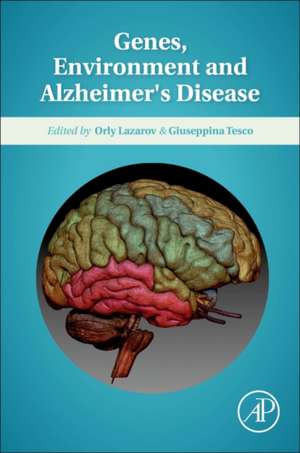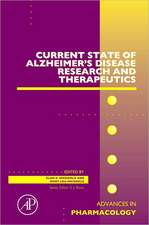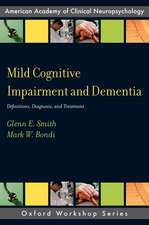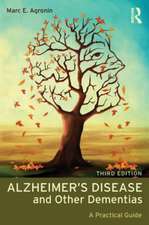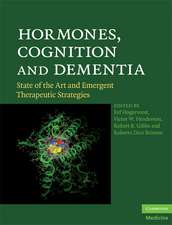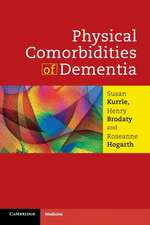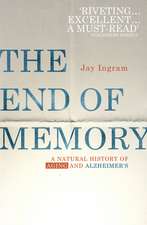Genes, Environment and Alzheimer's Disease
Editat de Orly Lazarov, Giuseppina Tescoen Limba Engleză Hardback – 15 apr 2016
It is now clear that brain insult is an environmental risk factor for AD, while on the other hand, lifestyle components such as exercise and level of education may play a protective role, delaying the onset and/or severity of the disease. Evidence from experiments in rodent models of Alzheimer’s disease contributes major insight into the molecular mechanisms by which the environment plays its role in AD. Additionally, there are diseases related to lifestyle that may lead to AD. This volume reviews new discoveries related to all these factors, serving as a translational tool for clinicians and researchers interested in genetic and environmental risk factors for the disease.
- Provides the first volume to link genetic and environmental risk factors for Alzheimer’s disease and dementia
- Aids researchers and clinicians in understanding the basic mechanisms of Alzheimer’s disease and cognitive decline
- Brings the basic science and clinical perspectives together in a single volume, facilitating translational possibilities
- Includes a range of molecular to behavioral components assembled into a single volume that creates an excellent resource for basic and clinical neuroscientists
Preț: 419.18 lei
Preț vechi: 572.44 lei
-27% Nou
Puncte Express: 629
Preț estimativ în valută:
80.22€ • 83.64$ • 66.67£
80.22€ • 83.64$ • 66.67£
Carte tipărită la comandă
Livrare economică 13-27 martie
Preluare comenzi: 021 569.72.76
Specificații
ISBN-13: 9780128028513
ISBN-10: 0128028513
Pagini: 448
Dimensiuni: 152 x 229 x 27 mm
Greutate: 0.84 kg
Editura: ELSEVIER SCIENCE
ISBN-10: 0128028513
Pagini: 448
Dimensiuni: 152 x 229 x 27 mm
Greutate: 0.84 kg
Editura: ELSEVIER SCIENCE
Public țintă
Basic and clinical neuroscientists working on AD, cognitive decline and dementiaCuprins
1. What Is Cognition? Molecular Mechanisms of Learning and Memory
Daniela Puzzo, Jole Fiorito, Rosita Purgatorio, Walter Gulisano, Agostino Palmeri, Ottavio Arancio and Russell Nicholls
2. When Cognitive Decline Becomes Pathology: From Normal Aging to Alzheimer’s Disease
Eliezer Masliah and David P. Salmon
3. Adult Neurogenesis and Cognitive Function
Keri Martinowich and Robert J. Schloesser
SECTION I. Genetic Forms of AD
4. APP and Cognition
Robert Marr
5. FAD Signaling, PS and Cognition
Li Gan
SECTION II. Environmental Factors
6. The effect of APOE genotype on amyloid-independent mechanisms
Guojun Bu
7. Lifestyle and AD
Orly Lazarov
8. Bace and Cognition
Giuseppina Tesco
9. Traumatic Brain Injury and Rationale for a Neuropsychological Diagnosis of Diffuse Axonal Injury
Douglas H. Smith
10. Alzheimer's Disease and the Sleep-Wake Cycle
Adam W. Bero and Li-Huei Tsai
11. Stroke, Cognitive Function and Alzheimer’s Disease
Katherine A. Jackman
12. Cerebral innate immunity: a new conceptual framework for Alzheimer’s
David Gate and Terrence Town
13. Type 2 Diabetes and AD
Marcelo Bonini
Daniela Puzzo, Jole Fiorito, Rosita Purgatorio, Walter Gulisano, Agostino Palmeri, Ottavio Arancio and Russell Nicholls
2. When Cognitive Decline Becomes Pathology: From Normal Aging to Alzheimer’s Disease
Eliezer Masliah and David P. Salmon
3. Adult Neurogenesis and Cognitive Function
Keri Martinowich and Robert J. Schloesser
SECTION I. Genetic Forms of AD
4. APP and Cognition
Robert Marr
5. FAD Signaling, PS and Cognition
Li Gan
SECTION II. Environmental Factors
6. The effect of APOE genotype on amyloid-independent mechanisms
Guojun Bu
7. Lifestyle and AD
Orly Lazarov
8. Bace and Cognition
Giuseppina Tesco
9. Traumatic Brain Injury and Rationale for a Neuropsychological Diagnosis of Diffuse Axonal Injury
Douglas H. Smith
10. Alzheimer's Disease and the Sleep-Wake Cycle
Adam W. Bero and Li-Huei Tsai
11. Stroke, Cognitive Function and Alzheimer’s Disease
Katherine A. Jackman
12. Cerebral innate immunity: a new conceptual framework for Alzheimer’s
David Gate and Terrence Town
13. Type 2 Diabetes and AD
Marcelo Bonini
